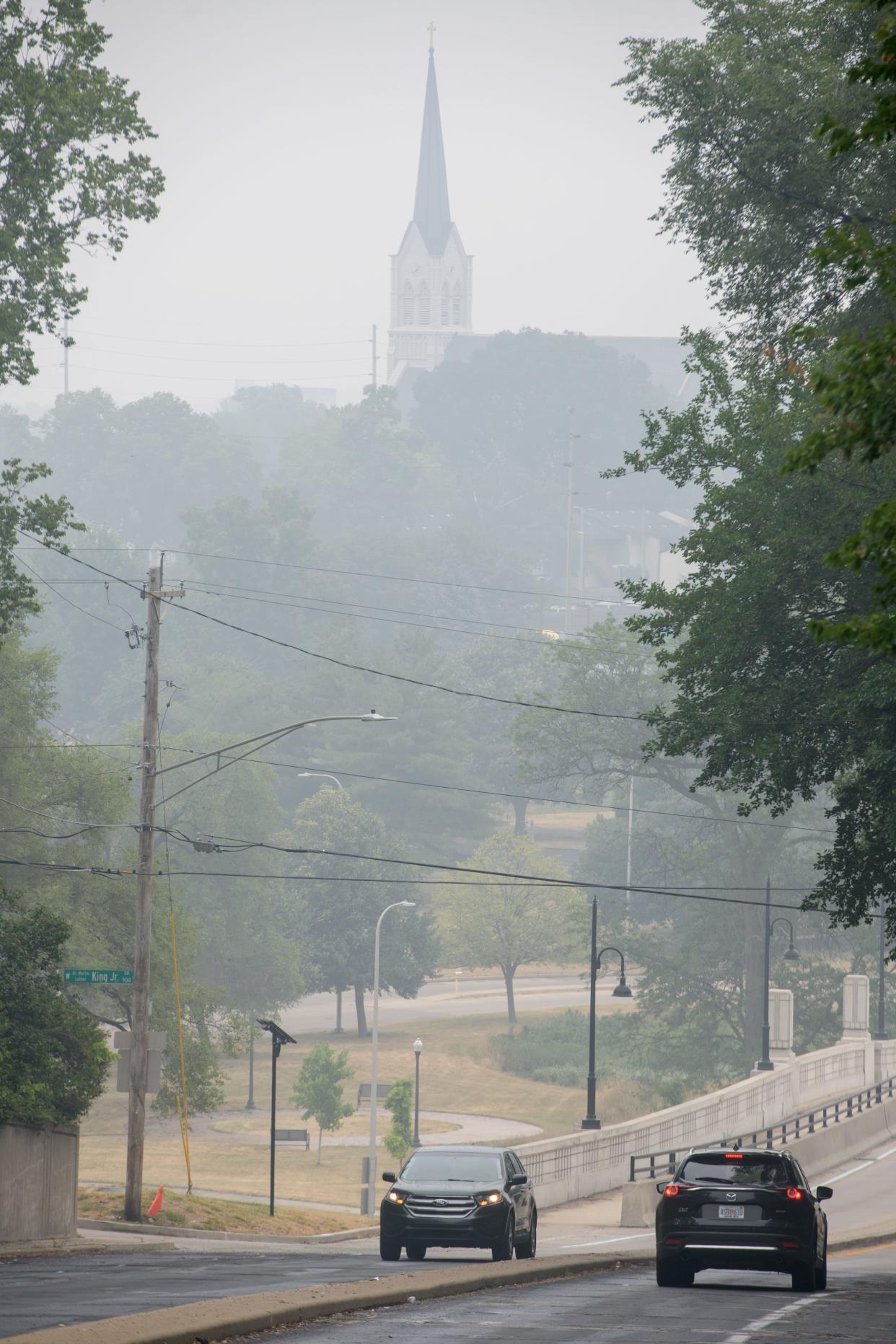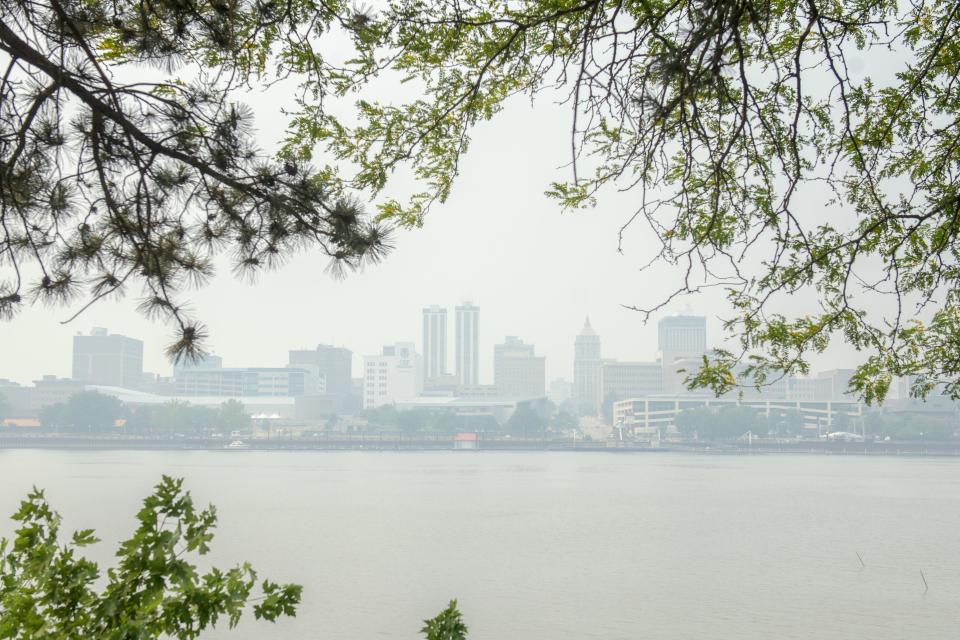'Like smoking a pack of cigarettes': Breathing Peoria's smoky air can affect your health

PEORIA – Kirk Huettl, a meteorologist with the National Weather Service’s Lincoln office since 1998, has never seen air quality this poor in central Illinois.
Smoke from the Canadian wildfires is continuing to hover over most of Illinois, prompting warnings from the Environmental Protection Agency. As of 5 p.m. Wednesday, all of Peoria was swathed in purple on the EPA’s air quality map, the visual representation of very unhealthy air.
“We’ve been in the orange and even in the red sometimes, but to see the purple color, and how long it stuck around ... because it’s still around today yet. I don’t recall it being quite this extensive in our area,” said Huettl.
Central Illinois residents don’t need a map to know there’s something in the air, however. Tiny airborne particles have created a cloud over the city and diminished visibility to as little as a mile. The air also has an odor that has seeped into homes, businesses and vehicles.
“It’s like a campfire smell, and you can only take so much of that,” said Heuttl.
Look outside: Watch live traffic and road conditions on the McClugage Bridge in Peoria with BridgeCam
Warnings have been issued to help minimize negative health effects from the lingering smoke, which can cause a variety of symptoms, from stinging eyes to coughing, headaches, chest pain and rapid heartbeat. Though the smoke is more likely to have negative effects on children, older people, and people with heart and lung issues, at current high levels it can affect everyone.
“My sister lives in New York City, which had really bad smoke earlier in June, and they were saying being outside breathing that air was like smoking a cigarette per hour. So if you are out for a whole day, it’s like smoking a pack of cigarettes,” said Huettl.

How does smoky air affect the body?
Wildfire smoke contains particulate matter so small it bypasses the body’s natural defenses against inhaled matter, said Dr. Brian Curtis, vice president of clinical specialty services lines at OSF HealthCare.
“Your body is set up to keep things from getting deeper into your lungs. You have nose hairs and you have mucus to try and capture dust and stuff," he said. “But some of this finer particulate matter can get deep into your lungs, and that’s why people with pulmonary problems, and even people without problems, notice that it’s a little tougher today. If you were working out, you may notice it.”
As the body works to clear particulate matter, it will eventually end up in the bloodstream, where it could lead to inflammation in other parts of the body, said Curtis.
While there has been no significant increase at area emergency rooms from patients affected by smoky air, OSF has seen a slight uptick in the number of patients visiting their prompt care facilities, said Curtis.
More: Peoria's LGBTQ community, affordability gain national attention with TV news segment
Dr. Ravindra Kashyap, a pulmonologist with Carle Health Methodist Hospital, has heard from several patients affected by the smoky air. He said that until air quality returns to normal, everyone should minimize their time outdoors.
“Even if you are a completely healthy adult, please try to exercise indoors. Go outside if you need to — you can go to the grocery store or work — just minimize exposure. On the other hand, if you have COPD or heart disease, please avoid even shopping for the next two or three days if you can,” he said.
What people in central Illinois are breathing at the moment is second-hand smoke, said Kashyup. While two or three days of exposure isn’t likely to lead to lasting health effects, long-term exposure can.
“Air pollution can lead to COPD without smoking, chronic bronchitis, cardiovascular disease, even lung cancer,” said Kashyup. “It is a known fact that people in some cities are living shorter lives because of everyday exposure to the smog that is common in Beijing and other places. It decreases life expectancy.”
Cleaner air is on the way
Central Illinois has generally been fortunate when it comes to air quality. Unlike larger cities, smog events are few. Forecasters were predicting an end to the current situation when winds were expected to shift from north to south late Wednesday and begin to lift the smoke out of the area.
Enough smoke is expected to remain in the area Thursday for the EPA to extend the air quality warning through 7 p.m. for people with health issues that make them more vulnerable.
An additional piece of good news is that the weather pattern is expected to change in coming days, bringing relief not only from the smoke, but possibly even the drought. Huettl said warmer, wetter air is coming, and with it, greater chances of rain. And if that weather pattern extends into Canada, it could even help tamp down some of the fires.
“I know they are in a drought up in Canada, too,” he said. “I think if we can see some of those more widespread rains developing in Canada as well, that could help. And the wind flow in central Illinois will help as well, if we can keep our winds more out of the south instead of the north.”
Leslie Renken can be reached at (309) 370-5087 or lrenken@pjstar.com. Follow her on Facebook.com/leslie.renken.
This article originally appeared on Journal Star: Illinois air quality: Canadian wildfire smoke can affect your health

